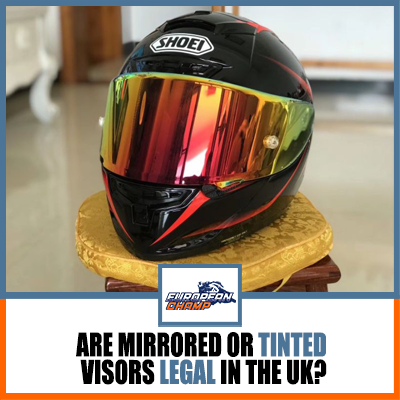Motorbike riders are typically not given the best visibility on the road. For this reason, many opt to purchase visors that have a tint or mirror finish to improve their ability to see clearly while riding.

However, there is some confusion over whether these types of visors are legal in the United Kingdom, so we will explore this question and answer it for you below!
What is the law in the UK about mirrored or tinted visors on helmets?
Currently, no law in the United Kingdom prohibits motorbike riders from using visors with a tint or mirror finish. However, it does not mean that you can use one if you like: some police forces and local councils may still instruct their officers to issue fines for such items on safety grounds.
What do I risk by using a mirrored or tinted visor?
In some cases, you may be issued a fine for using a helmet with a mirror finish based on safety.
It is important to note that if your local council has any issues with such an item being used then it can ask officers from traffic police and local authorities to take action against you.
What are the benefits of using a visor?
Visors with mirror finishes can provide riders with better visibility when driving, especially in low light or nighttime. This means that they may have an easier time seeing obstacles on the road and other vehicles travelling alongside them.
This improved visual perception could also mean fewer accidents.
What are the risks of using a visor?
Visors with mirror finishes can be more challenging to see through in direct sunlight, which may mean you are driving with impaired vision when it is essential for good visibility!
This could potentially increase your risk of having an accident and leaving yourself open to fines or being involved in collisions.
Is this just a UK issue?
This is only an issue for those who reside within the United Kingdom, as there are no laws on such items abroad! However, some countries have their own rules about what can and cannot be used when it comes to visors: please check with your local authorities before travelling abroad.
Can I use a different visor instead?
Yes! Many other types of helmets are available with visors that do not have mirror finishes, including those made from polycarbonate plastics or Lexan materials. These are usually ideal for riders who experience issues with their vision in direct sunlight and will provide clear and crisp vision while driving.
Are there any exceptions to the rule?
Yes! Some local councils do not appear to be enforcing this law at all, so you should check with your counsel before using a visor that has a mirror finish just in case. Additionally, some motorcycle helmets have been designed specifically for motorsport use and include a visor that the governing body has approved for this sport.
Do I need to take precautions?
It is always recommended to check with your local council or traffic police if you live in the United Kingdom to find out whether they enforce such rules, as well as checking which types of helmets can be used legally on the road.
Are there any alternatives?
There are many other options available for riders who need to improve their visibility or have issues with direct sunlight, including visors made from polycarbonate materials and those that can be adjusted remotely by using levers and knobs on some models. In some cases, it may also be possible to purchase tinted visors that do not have a mirror finish.
What should I consider before purchasing?
It is always recommended for riders to check with their local council or traffic police if they live in the United Kingdom to find out whether they enforce such rules and check which types of helmets can be used legally on the road.
Why are some people against them?
Some riders and motorists who oppose using such items believe that they pose a risk to other people on the road, as it is more difficult for them to see motorcyclists. However, others claim these fears are unfounded and may be based on driving behaviours or attitudes rather than actual evidence!
How do they affect the visibility of other drivers and riders?
Some drivers and riders believe that such products can limit the visibility of other motorists, which could potentially cause accidents or endanger people on the road. However, this belief is not supported by evidence and may be based on driving behaviours than actual statistics!